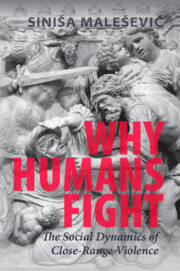Crossref Citations
This Book has been
cited by the following publications. This list is generated based on data provided by Crossref.
Malešević, Siniša
2022.
Randall Collins, Explosive Conflict: Time-Dynamics of Violence.
Society,
Vol. 59,
Issue. 6,
p.
795.
Malešević, Siniša
2023.
The Blackwell Encyclopedia of Sociology.
p.
1.
Gilmartin, Niall
2023.
Civil society, solidarity and collective action: Conflict-related displacement in Northern Ireland's Troubles, 1969–1974.
Irish Journal of Sociology,
Vol. 31,
Issue. 3,
p.
281.
Malešević, Siniša
2023.
The moral fog of war and historical sociology.
European Journal of Social Theory,
Vol. 26,
Issue. 4,
p.
490.
Conversi, Daniele
2023.
Barcelona, Naples and Salonika: Ethnic and Civic Nationalism in Three Mediterranean Port Cities (1888–1915).
Histories,
Vol. 3,
Issue. 3,
p.
288.
2023.
Publications Received.
Contemporary Sociology: A Journal of Reviews,
Vol. 52,
Issue. 2,
p.
195.
Malešević, Siniša
2024.
Are wars rational?
On Wars
, by Michael Mann, New Haven, CT and London, Yale University Press, 2023, 616 pp., £30.00/$40.00 (hardback), ISBN 9780300266818
.
Journal of Political Power,
p.
1.
Kuznar, Andriana Bencic
2024.
Understanding war: The sociological perspective revisited.
European Journal of Social Theory,
King, Anthony
2024.
Cohesion, Combat Performance and Civil-Military Relations: Contextualizing “The Word of Command”.
Armed Forces & Society,
Ateş, Barış
and
Akal, Mustafa Yücehan
2024.
Türk Ordusunda Küçük Birlik Uyumu: Lider, Görev ve Kültürel Değerler.
Türk Savaş Çalışmaları Dergisi,
Šimić , G.
2024.
Acceptance of international criminal justice in Bosnia and Herzegovina.
Law and Safety,
Vol. 92,
Issue. 1,
p.
142.
Kononov, Illia
2024.
Ukrainian refugees of the period of the Russian-Ukrainian war in NATO countries: the geopolitical context of the military migration crisis.
Canadian Foreign Policy Journal,
Vol. 30,
Issue. 1,
p.
11.
Malešević, Siniša
2024.
Book review: The enlightenment and violence.
European Journal of Social Theory,





